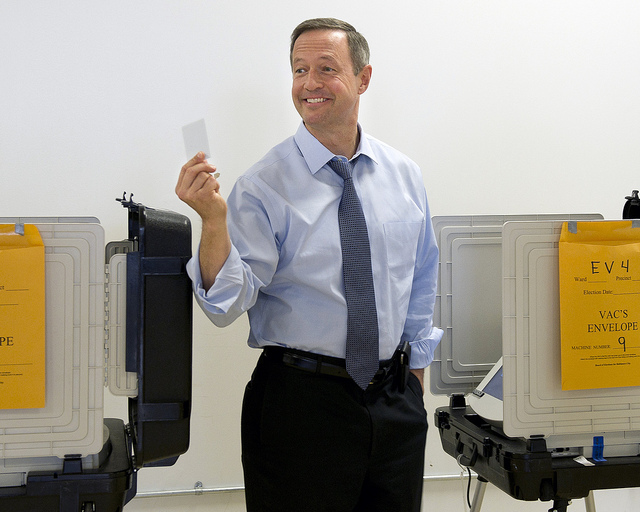The polling and registration process needs to be made simpler, more convenient and better resourced
The UK suffers from low electoral turnout, with young people in particular increasingly unlikely to turn out to vote in elections. At the same time, critics of our current electoral infrastructure highlight the risk of fraud. Here, Toby S. James, and Alistair Clark show that our polling and registration processes should be made simpler and more convenient, but also better resourced, to ensure integrity and efficiency when Britain goes to the polls.

Credit: Maryland GovPics, CC BY 2.0
Last week Dominic Grieve, the former attorney general, claimed that electoral fraud is a ‘growing phenomena’ in British elections. It is a problem, he suggested, that was predominantly ‘where there are high levels of inhabitants from a community in which there is a tradition of electoral corruption in their home countries’.
He is not the first person to claim this. Richard Mawrey QC has previously suggested that postal voting allowed ‘industrial scale fraud’ and Conservative Councillor Peter Golds has suggested that personation and undue influence was common at polling stations. The commonly proposed remedies are the abolition of postal voting and voter ID requirements. As Eric Pickles’ review of electoral fraud closed last week, these ideas will no doubt be considered.
But there should not be a rush to introduce either voter ID or abolish postal voting. Often allegations of fraud are partisan in nature, designed to discredit opponents. Both of these proposals would be likely to impact negatively on turnout at British elections, which is already low. Our new study, also shows that electoral fraud is not the biggest problem faced at elections.
We conducted a survey of poll workers at the 2015 general election – the first of its kind in Britain. We have provided a summary of this to Eric Pickles’ commission for consideration as evidence.
This found that elections were actually very well run. Poll workers were highly experienced, well trained and had confidence in the electoral process. Elections owe much to the ‘unsung heroes’ on the frontline of democracy.
There were some poll workers who were concerned about electoral fraud. Roughly 1 per cent were concerned that there might have been a problem in their polling station but those that gave more detail stressed that this could have been due to a lack of understanding rather than a deliberate attempt to manipulate the process. Roughly 5 per cent said that they were uncertain about at least one person’s identity in their poll.
But by far the widespread problem was people asking to vote who were not on the register, presumably because they were not registered or had gone to wrong polling station. Over two thirds of polling stations turned away at least one citizen from voting because their name was not on the electoral register.
This points to how electoral fraud is not the only problem that needs to be considered when this review makes recommendations. Levels of electoral registration have been in long-term decline: from an estimated 96% in the 1960s to 82% in 2011. The introduction of individual electoral registration has recently been implemented, which has tightened up opportunities for electoral fraud in registration process. But it has long been forecast that it will lead to lower levels of electoral registration. If the transition is fast-tracked to December 2015, we may see more people being turned away in 2016’s elections.
We therefore recommended to Eric Pickles that the voting and registration process is not made more difficult for citizens unless other measures to redress crisis levels of participation and registration are introduced. In particular, we suggest that feasibility of automatic registration and allowing citizens to vote at other polling stations is investigated. This could be done on a pilot basis initially, if necessary.
Unlike politicians, citizens do not think about elections and electoral registration every day of their lives. Research that we have done elsewhere shows how many people think that they are already on the electoral register because they pay council tax. At the same time, electoral services departments are under pressure because of lack of resources, while the elections petition system is not fit for purpose. The polling and registration process needs to be made simple, convenient and properly resourced.
—
This post originally appeared on the PSA Blog. It represents the views of the authors and not those of Democratic Audit or the LSE. Please read our comments policy before posting.
—
 Dr. Alistair Clark is Senior Lecturer in Politics at Newcastle University. His research examines electoral integrity and administration, political parties and party systems. He is the author of Political Parties in the UK (Palgrave 2012), and a member of the UK Political Association Executive.
Dr. Alistair Clark is Senior Lecturer in Politics at Newcastle University. His research examines electoral integrity and administration, political parties and party systems. He is the author of Political Parties in the UK (Palgrave 2012), and a member of the UK Political Association Executive.
 Dr. Toby S. James is Senior Lecturer in Politics at University of East Anglia. He has published widely on electoral administration and management, including his book Elite Statecraft and Election Administration (Palgrave, 2012). He is a member of the advisory board of the Law Commission’s Review of Electoral Law.
Dr. Toby S. James is Senior Lecturer in Politics at University of East Anglia. He has published widely on electoral administration and management, including his book Elite Statecraft and Election Administration (Palgrave, 2012). He is a member of the advisory board of the Law Commission’s Review of Electoral Law.





 Democratic Audit's core funding is provided by the Joseph Rowntree Charitable Trust. Additional funding is provided by the London School of Economics.
Democratic Audit's core funding is provided by the Joseph Rowntree Charitable Trust. Additional funding is provided by the London School of Economics.
The polling and registration process needs to be made simpler, more convenient and better resourced https://t.co/7vpkDcBKI1
Toby S. James & Alistair Clark write polling & registration need to be simpler, more convenient + better resourced https://t.co/uBzqgsrSrS
The polling and registration process in UK elections needs to be made simpler, more convenient and better resourced https://t.co/CFek0YxyUo
The polling and registration process needs to be made simpler, more convenient and better resourced https://t.co/guPxLdLR9A
The polling and registration process needs to be made simpler, more convenient and better resourced https://t.co/qJk9z0UkPq
.@ClarkAlistairJ & @TobySJames, re auto registration, what to do about people who don’t want to be registered? https://t.co/Kn7NsUWAHK
Interesting article, @ClarkAlistairJ & @TobySJames. What reason for allowing voting at other polling stations? https://t.co/Kn7NsUWAHK
The polling and registration process needs to be made simpler, more convenient and better resourced https://t.co/enmUjp73DE
The polling and registration process needs to be made simpler, more convenient and… https://t.co/ojyByoEtAW https://t.co/KM7YRJfYsY